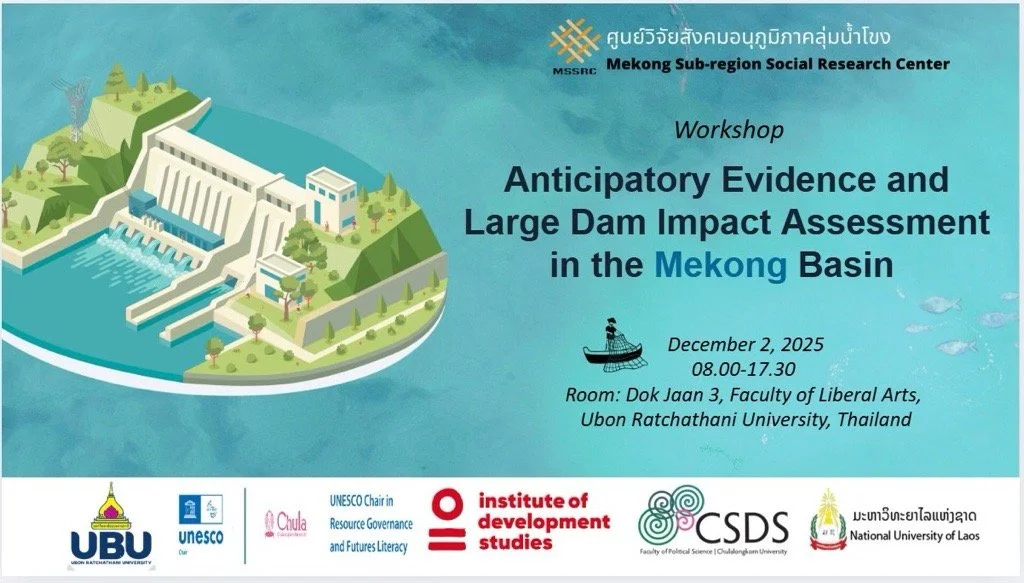UPCOMING EVENT: Anticipatory Evidence and Large Dam Impact Assesment in the Mekong Basin [2 Dec 2025]
/View the full program here
Workshop on “Anticipatory Evidence and Large Dam Impact Assessment in the Mekong Basin”
2 December 2025
Organized by: Faculty of Liberal Arts, Ubon Ratchathani University; Faculty of Law and Political Science, and Office of Post Graduate Studies, National University of Laos; Institute of Development Studies; and Center for Social Development Studies, Chulalongkorn University
The launch workshop in August 2025 initiated a regional dialogue on the role of anticipatory evidence generated through Impact Assessments (IAs) in shaping large dam planning and governance across the Mekong Basin. It brought together researchers, policymakers, and civil society actors to interrogate how IAs have been mobilized as an international “best practice” and how they inform decisions on whether and how large-scale water infrastructure projects proceed. The discussions highlighted the growing transition from the pre-project emphasis on anticipatory evidence, used to predict and justify decisions, to the increasingly urgent realities of post-IA monitoring, management plans, governance and the lived experiences of affected communities. This shift underscores a critical policy juncture: while IAs remain central in law and practice, the adequacy of their long-term relevance and implementation is increasingly contested.
The launch workshop also confirmed that post-IA processes remain a neglected conceptual and policy space, even as donors, civil society organizations, and regional think tanks have called for more coordinated engagement. For affected populations, large dams continue to present long-term challenges, and civil society associations often become the primary vehicles through which these concerns are raised. These dynamics underline the importance of creating stronger relationships and networks among evidence producers, intermediaries, and users, and ensuring that anticipatory evidence is not only generated before construction but is meaningfully carried through into post-IA monitoring and governance.
Building on this foundation, the second workshop brings the conversation closer to on-the-group experiences by focusing on the Pak Mun Dam and the Khong Chi Mun water diversion project. Both cases provide long-term perspectives on how IA findings and management plans unfold in practice: which impacts were anticipated, underestimated, or ignored, and how communities continue to adapt, contest, and negotiate the consequences. Situated in Ubon Ratchathani, near the Pak Mun Dam, the workshop will engage with lived experiences, testimonies, and local knowledge systems to enrich ongoing debates on post-IA practices and governance. Such reflections are particularly timely as Pak Mun stands as one of the most studied and contested dams in the region, while Khong Loei Chi Mun represents a more recent struggle around water diversion and its post-IA governance challenges.
By situating the workshop in Ubon Ratchathani, close to the Pak Mun Dam and communities directly affected, the event will engage with lived experiences, testimonies, and local knowledge systems. This approach ensures that the debate on anticipatory evidence is not only academic or policy-driven, but also rooted in the realities of people whose lives and livelihoods have been profoundly shaped by these projects. Ultimately, the workshop will contribute to developing a deeper understanding of how anticipatory evidence can better inform inclusive, accountable, and evidence-based governance of water infrastructure in the Mekong, while foregrounding the knowledge and agency of affected communities.
Objectives
The objectives of the second workshop are to:
Deliberate on lessons from the Pak Mun Dam and Khong Loei Chi Mun water diversion as long-term cases during the post-impact assessment, examining how anticipatory evidence was taken forward, discounted, or contested.
Reflect on persistent socio-ecological and gender-differentiated impacts, and assess how post-IA monitoring and management plans have addressed or failed to address these realities.
Identify approaches for linking anticipatory evidence with post-IA practices, drawing from local knowledge, community experiences, interdisciplinary research and government management practices to strengthen more inclusive and accountable dam governance in the Mekong Basin
The meeting will be held in Thai with simultaneous translation to English.
View the full program here
Agenda



